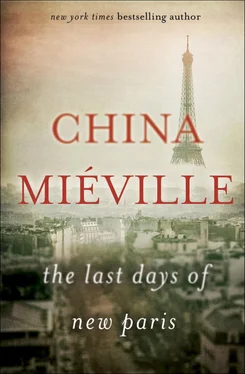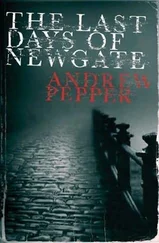Some soldiers tried and failed to stop him doing it again, others joined in with him. Over the echoes of carnage the manif kept up its cry. Thibaut remembers how his father fell, and his mother, trying as she did to shield him, and how he fell himself after them, not knowing if his legs had given way or if he was playing dead to live. He had heard more shouts and the manif voice closer still and the sounds of new violence.
And then finally when all the screaming and the shots were done, Thibaut raised his head slowly from amid the dead, like a seal from the sea.
He was looking into a metal grille. The visor of a plumed knight’s helmet. It was vastly too big. It was centimeters from his own face.
The helmeted presence stared at him. He blinked and its metal trembled. He and it were all that moved. All the Germans were dead or gone. The manif lurched but Thibaut was still. He waited for it to kill him and it held his gaze and let him be. It was the first of many manifs to do so.
The thing swayed up and back from the flesh and debris of the killing ground. It reared, seven, eight meters tall, an impossible composite of tower and human and a great shield, all out of scale and made one looming body, handless arms held almost dainty by its sides, its left thronging with horseflies. It declared itself mournfully, an echoing call of faceplate hinges. When that noise ebbed the huge thing stalked away at last on three limbs: one huge spurred man’s leg; a pair of women’s high-heeled feet.
And there was quiet. And Thibaut, war’s boy, had crawled shivering at last through the hecatomb in a field of rubble, to where he found the corpses of his parents and wept.
He has often imagined a vengeful hunt for that officer who first fired, but Thibaut cannot remember what he looked like. Or for the man or men whose ammunition killed his parents, but he doesn’t know who they were. They were all probably among those shot by their own comrades in the chaos, in any case, or crushed by bricks when the manif toppled the façade.
In rue Giroux, masonry slumps in sloppy drifts. Bricks bounce down a broken slope and a young woman emerges, her face bloody and filthy and her hair spiked with dirt. She does not see Thibaut. He watches her bite her nails and scurry on.
One of the trapped thousands. The Nazis will never allow Paris to contaminate France. All roads in and out are locked down.
When it was clear that the manifs, the new things with their new powers, would not disappear, before the Reich had settled for this containment, it had tried first to destroy, then to use them. Or to bring forth its own, less capricious than its infernal allies. The Nazis had even succeeded in invoking a few things with their manifology: incompetent statuettes; a Céline weltgeist, fungal lassitude, semi-sentient dirt and enervation infecting house after house. But their successes were few, unsustainable, uncommandable.
Now, years on, it seems to Thibaut that the number of manifs has started to diminish. That this is the second epoch of the post-blast city.
Of course Paris still teems. Just walk if you doubt that, he thinks, see what you meet. Enigmarelle, foppish robot staggered out of an exhibition guide, arms out to lethally embrace. The dreaming cat, as big as a child and incompetently bipedal, watching with sentient intent. You will encounter such figures, Thibaut thinks. For a while yet.
And if you go on walking like that and stay safe and keep out of sight then you will come some time to be alone again and there will be a stretch of window and bricks untouched by war and you could, for an instant, believe yourself back in old Paris.
I miss nothing, Thibaut insists to himself once more. Not the pre-war days, nor the recent relative safety of the ninth arrondissement. The stranded Nazis in the tenth could never take those streets, or the altered landscapes they crisscrossed, the sagelands, smoothed alpine topographies like sagging drapes, houses of frozen rooms full of clocks, places where the geography echoed itself. The ninth was too completely made of recalcitrant art for anyone to take. It would shelter no one but the partisans of that art—the Surrealist stay-behinds, soldiers of the unconscious. Main à plume.
I don’t miss a thing. Thibaut clenches his fist on his weapon.
Each riverbank tree here is in a different season. Dead leaves and live. Thibaut wants railway lines. Routes out. Under one lamppost, it is night. He leans against it and sits and for long minutes looks up at stars.
Do I even deserve these places any more? They came at the wrong time and they came in the wrong way. Liberation was fucked up. But if Thibaut can find no spark of joy in them, he thinks, maybe he is no better than one of Stalin’s men. Or a drone for de Gaulle, an enemy of true freedom.
That isn’t me, he thinks. No.
He stands and steps back into the sunlight beyond the tiny manif nightlet, and as he does a howl fills the street.
Instantly Thibaut drops, takes cover behind the stub of a pillar, weapon raised. War has taught him how to be very still. That is not a human noise—nor, he is sure, that of a manif.
He waits. He controls his breathing and listens to a heavy approach. Something comes slowly into view. Thibaut sights down his rifle and tightens his grip.
A swaying body like a great bull’s. Its flanks are bloodied, and rainbowed as if with petrol on water. On its brow the thing has many long, gray, random horns, some broken. It bellows again and shows meat-eater tusks.
It does not move with the dreamlike specificity of a manif but with a thudding, broken step that he can feel through the ground. It comes with nothing of that stir of recognition—even at something inconceivable that he has never previously seen—that a manif brings him. It oozes and drips and raises nausea in Thibaut. Its blood crackles and smokes and hits the pavement in spots of flame. The beast shakes its head and flecks fly from its horns to land wetly. Thibaut’s innards spasm, and he knows from that clench that those are gobbets of manif.
If the devils and the living art cannot avoid each other, they will fight, terribly. The artflesh dripping from the demon’s face is fresh.
In the days after the S-Blast, the German forces and the newcomer manifs had been joined, appallingly, by such as this misplaced invader, battalions from below.
The exigencies of survival sent some of Thibaut’s comrades trying to make sense of these fallen, now risen, embarrassments. They accumulated expertise from bad books they hunted and found. They cajoled information from captured German summoners and specialist priests in Alesch’s nascent bishopric. The intrepid eavesdropped on snips of the demons’ bayed discussions, they pieced together information, parsed rumors of ill-tempered pacts between Hell and the Reich. Élise might have been able to tell him what kind of fiend it is he looks at, as he prays, if to no God, that it will not look at him: all Thibaut knows is that it is a devil, and a big one.
Like most of its kind the thing is obviously in pain. But that size, whatever its injuries or sickness, they will not help him. The few trinkets he has in his pack for use against the infernal are inadequate: it will kill him if it finds him.
But the beast shambles painfully away on what seems a varying number of legs and does not look in his direction. It leaves a trail of burning blood and broken ground.
He waits until it turns off the street, out of sight, and he listens to it haul itself away, and he waits longer until he can hear nothing. Only then does Thibaut slump at last, fingering his nightskirt. Even that, he thinks, tracing the edge of its hem, would not have saved him. I should get off the streets, he thinks. Then: Maybe I should take the Métro, he taunts himself.
Читать дальше













